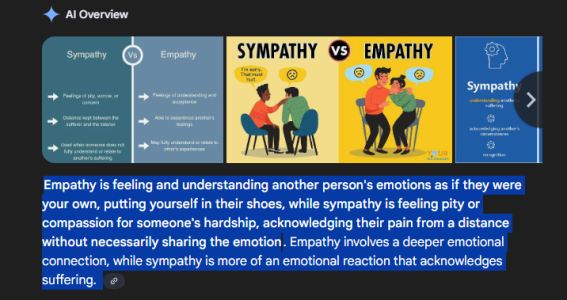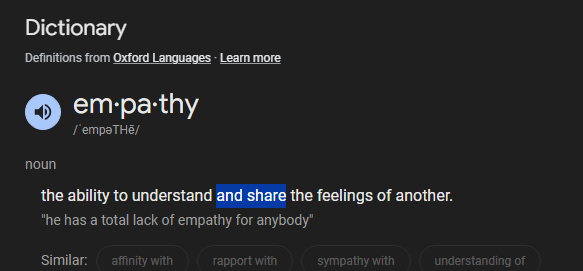No, I could think through the circumstances of a shark bite and its consequences and have a good idea of what the person's faced and facing and have no sympathy for them. If they're stupid enough to jump in a shark tank on a dare they deserve no sympathy.
The distinction seems pretty clear.


It seems to entail an understanding that comes from
sharing in what one feels. Feeling what they feel as though the feelings are your own.
Sympathy seems to be the ability to feel compassion for what
someone else if going through.

I can better empathize with someone who's lost a loved one if I have lost a loved one. If I haven't lost a loved one, I can have sympathy/compassion by imagining what they must be going through.
To be honest, the criticism sounds like little more than sour grapes and post-assassination character assassination, considering the level of twisting needed to turn it into a criticism.
I listened to CK's quote on that. He basically said that he doesn't like the concept that someone must be able to feel a pain on behalf for someone else to offer compassion. It's a greater ability to be able to have sympathy for things you can't feel or completely understand.
I gave an example. It will be hard for me to have empathy for someone that has gender dysphoria. But I can seek sympathy for them.
What is the greater ideal? To give compassion to those that I empathize with? Or to give compassion to those that I can't empathize with?
I suspect Charlie was riffing on Jesus' principal:
“If you love those who love you, what benefit is that to you? For even sinners love those who love them. And if you do good to those who do good to you, what benefit is that to you? For even sinners do the same.
If you can only offer compassion to those who are like you, what great ideal have you lived out?
Isn't it a greater expression of compassion to give it to those who are not like you?
You would think the left would fawn over that concept. But that wouldn't be very politically expedient, would it?



www.bbc.com
